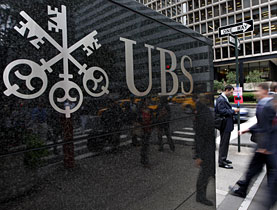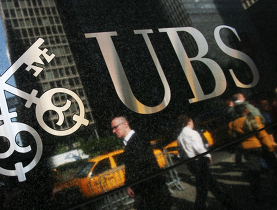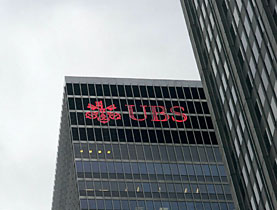Banking secrecy wobbles as data handed over

A decision to hand over confidential details of UBS clients to a United States tax-evasion probe may threaten Swiss banking secrecy, experts warn.
The gravity and timing of the controversial move has sparked intense political and legal debate in Switzerland amid fears it could open the floodgates to similar demands from other countries.
Switzerland is also faced with increasing pressure from European Union states to stop sheltering the cash of wealthy foreign citizens from their home tax authorities. Critics say banking secrecy, and the refusal to acknowledge tax evasion as a crime, makes Switzerland a prime bolt-hole for tax dodgers.
Switzerland’s largest bank, UBS, and the country’s financial regulator, Finma, announced on Thursday a settlement with the US authorities that accused the bank of helping thousands of its citizens illegally dodge taxes.
Under the terms of the deal, UBS has agreed to pay $780 million (SFr915.8 million) in fines after admitting “improper activities” from some of its employees.
Open to more attacks
But more significantly, Finma and the Swiss finance ministry unlocked the heavily guarded doors of banking secrecy to release confidential data of UBS customers to US investigators.
Peter Kunz, professor of business and comparative law at Bern University, said the decision could undermine the foundations of banking secrecy in Switzerland.
“Swiss bank secrecy laws are not only under attack from US authorities but also from the European Union, and I see no reason why other European countries would not act in the same way against Swiss banks,” he told swissinfo.
The US investigation into UBS is widely believed to be the start of a wider probe into other institutions. Germany and France recently called for Switzerland to be blacklisted as an uncooperative tax haven. Earlier this week British Prime Minister Gordon Brown launched a global crusade against tax pariahs.
Swiss Finance Minister Hand-Rudolf Merz played down the dangers, insisting that UBS client details were only handed over to the US because there was sufficient evidence of fraud. “Banking secrecy will stay,” he added.
The deal does not, however, cover an outstanding US court order to supply the US tax authority – the Internal Revenue Service – with more confidential details of UBS clients.
On Thursday, as expected, the IRS filed a civil suit in a Miami-based federal court seeking to force the bank to release information on as many as 52,000 American clients with assets hidden in Swiss accounts worth an estimated $14.8 billion.
UBS said in a statement that it “intends to vigorously contest” the lawsuit and that the settlement reached on Wednesday with the US Justice Department gives it room to fight the new legal action.
“Dubious behaviour”
Finma claimed that the data deal was also necessary to avert the immediate threat of UBS losing its US trading licence. The regulator invoked obscure sections of the banking laws that allow it to take measures to protect institutions from going bust.
But several UBS clients have already lodged a legal objection to their details being released with the Federal Court, and Kunz objected to Finma taking its decision before the verdict is heard.
“From a democratic and legal standpoint it is rather dubious behaviour from the authorities not to wait until the judicial procedure has been concluded,” he told swissinfo. “I doubt the legality of the provisions that Finma uses to support its demand that UBS hands over this client data.”
Kunz believes that the only way to preserve Swiss banking secrecy is to change the law to recognise tax evasion as a crime.
“We are constantly told that secrecy laws are not aimed at protecting tax evaders, so let’s strike out the legal distinction between evasion and fraud and avoid major pressure from abroad,” he said.
swissinfo, Matthew Allen
In December 2007, an American billionaire property developer admitted filing a false tax return and had to pay $52 million (SFr54 million) in backdated taxes.
On May 14, 2008, former UBS employee Bradley Birkenfeld and a Liechtenstein businessman were charged by the US authorities with helping an American billionaire avoid paying taxes on $200 million of assets deposited in Swiss and Liechtenstein bank accounts.
Birkenfeld turned whistleblower, giving details of UBS private banking practices to US prosecutors. The US Department of Justice (DoJ) accused UBS of helping 20,000 US citizens evade $20 billion of taxes.
In July, a Miami court authorised the IRS to issue a summons on UBS demanding the release of confidential information on clients the agency suspected of tax evasion.
In the same month, UBS told a congressional hearing that it would stop offshore banking activities for US clients.
In November, Raoul Weil, the head of UBS’s Wealth Management International division, was indicted in the US for allegedly helping US citizens evade taxes. Weil later absconded from the US and was declared a fugitive.
In February, UBS and the Swiss authorities caved in to the DoJ to release client information. However, the IRS demand for further information remains unresolved.
People wishing to dodge paying taxes on their assets can do so by three means: avoidance, evasion and fraud.
Avoidance is the legitimate means of structuring finances so they don’t fall under the scope of taxable assets. This can be done, for example, by setting up a trust fund or by changing country residence or nationality.
Evasion is the deliberate concealing the true state of assets from the tax authorities – in other words, lying about the extent of your assets. This is a civil offence in Switzerland and some other countries, such as Austria and Liechtenstein, but criminal in most states.
The main distinction between evasion and fraud is that the perpetrator tells lies on official documentation. Unless tax fraud can be proved, Swiss banks are not obliged to hand over details of client assets to investigators. In some cases this information is needed before fraud can be established in the first place.

In compliance with the JTI standards
More: SWI swissinfo.ch certified by the Journalism Trust Initiative




You can find an overview of ongoing debates with our journalists here. Please join us!
If you want to start a conversation about a topic raised in this article or want to report factual errors, email us at english@swissinfo.ch.